Key takeaways:
- Understanding key elements like royalties, rights ownership, and termination clauses is crucial for authors to protect their creative work and ensure fair compensation.
- Effective negotiation requires preparation, research, and clarity on your value as an author to advocate for better contract terms.
- Common pitfalls include overlooking subsidiary rights, promotional responsibilities, and timeline clauses, which can affect future opportunities and stress levels.
- Utilizing resources like the Authors Guild and consulting with a literary attorney can provide valuable support and insight throughout the contract process.
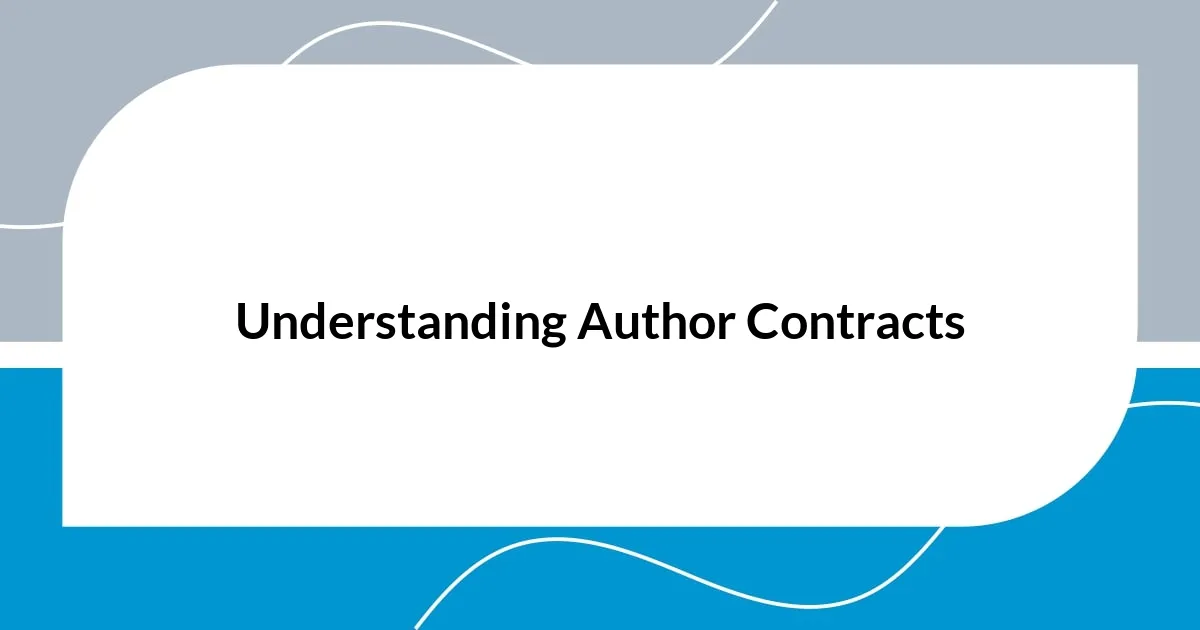
Understanding Author Contracts
Diving into author contracts can feel like uncharted waters, especially for new authors. I remember the first time I encountered a contract; I was flooded with questions about rights and royalties. Why is it so essential to understand these terms? It’s not just about the money; it’s about protecting your creative work and ensuring you’re compensated fairly.
When I first signed a contract, I was naive about the fine print. It was overwhelming to see clauses about copyright and distribution rights. This experience taught me that every line matters. For instance, does the contract grant the publisher exclusive rights to your manuscript? If yes, what does that mean for future projects?
Author contracts are not just legal documents; they’re a roadmap of your career as a writer. I like to think of them as a partnership agreement where both parties have responsibilities and benefits. Have you ever felt a little lost in the legal jargon? Trust me, you’re not alone. It’s crucial to dissect each section, as it can shape your artistic journey in ways you may not initially see.
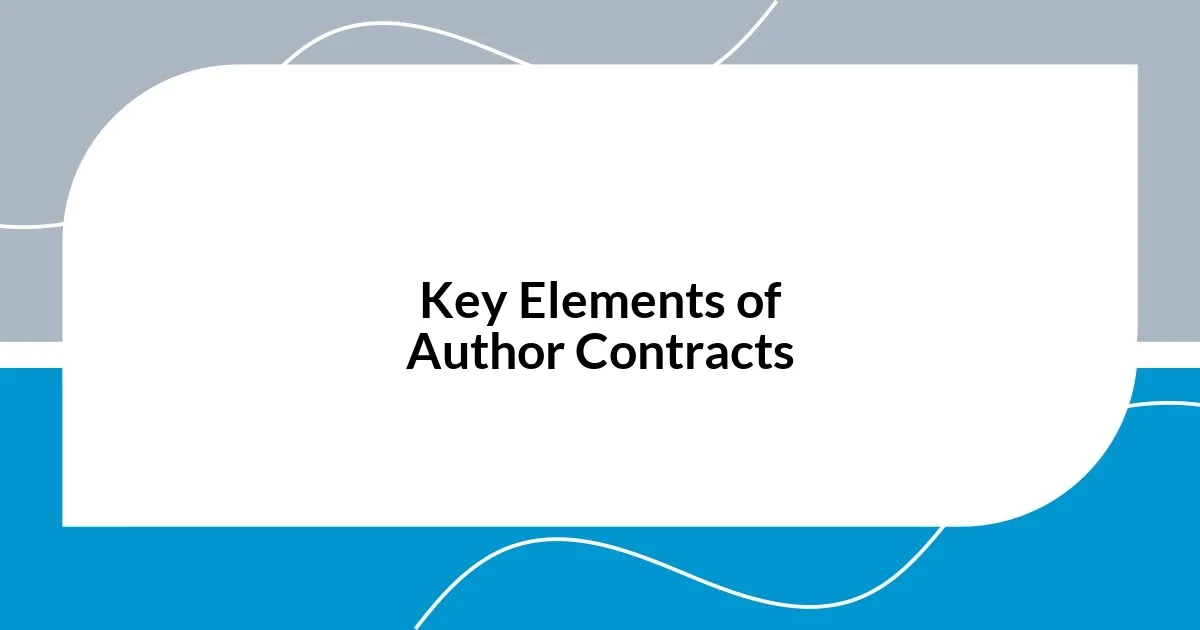
Key Elements of Author Contracts
Understanding the key elements of author contracts is like unveiling a map to your creative success. From my own experience, I’ve learned that clauses related to royalties and rights ownership are pivotal. For example, when I negotiated for a higher royalty percentage, it changed how I viewed my value as a creator. It’s essential to ensure the contract reflects your worth.
Another crucial aspect is the territory rights, which define where your book can be sold. I remember a situation where I missed an opportunity to publish internationally simply because the contract limited my book’s reach. Being aware of these restrictions can open doors for global readership, which is something every author should consider.
Lastly, don’t overlook the termination clauses. These details can often feel insignificant but can protect you if the relationship with the publisher doesn’t turn out as expected. I once learned this the hard way when a contract didn’t allow me to move forward with another publisher for years. Understanding all these components allows you to navigate the complex world of publishing with confidence.
| Key Element | Description |
|---|---|
| Royalties | The percentage of sales you earn from your work. |
| Rights Ownership | Who retains the copyright and the scope of rights granted to the publisher. |
| Territory Rights | Regions where the publisher can sell your book. |
| Termination Clauses | Conditions under which either party can end the contract. |
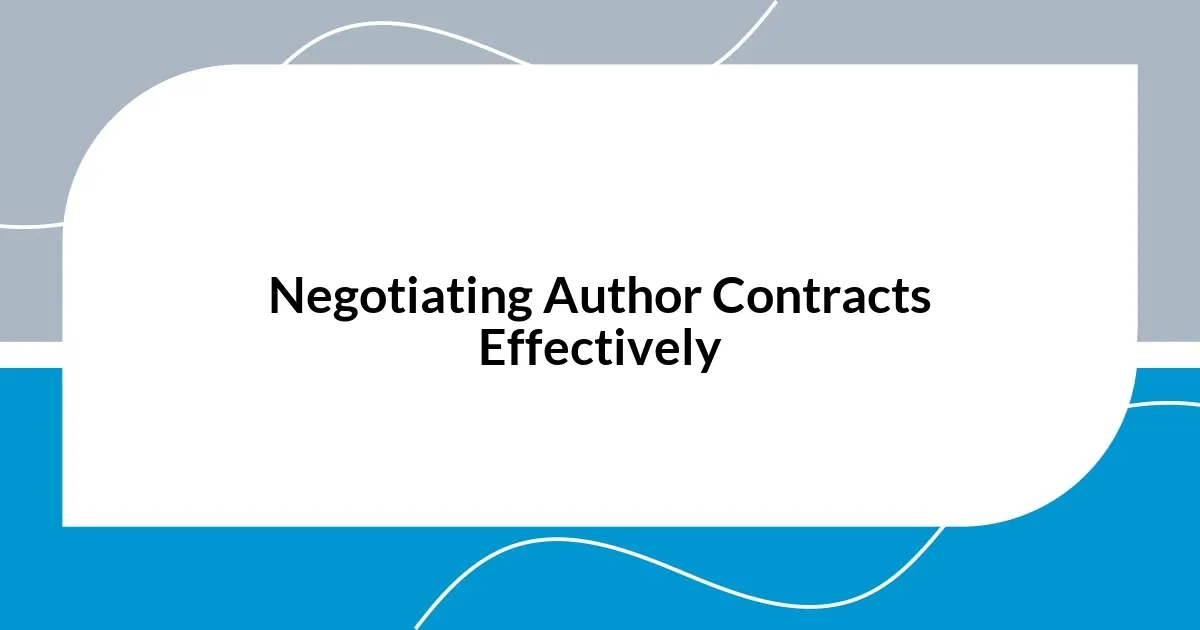
Negotiating Author Contracts Effectively
Negotiating author contracts effectively requires both preparation and confidence. I remember feeling a mix of excitement and anxiety during my first negotiation. It was clear to me that I needed to advocate for myself, even when I was unsure about certain terms. I quickly learned that doing my homework on industry standards beforehand empowered me to ask informed questions. Walking into negotiations equipped with knowledge instantly boosted my confidence.
When engaging in discussions, keep the following strategies in mind to enhance your negotiation skills:
- Research Thoroughly: Understand standard practices in publishing, including typical royalty rates and rights assignment.
- Know Your Value: Reflect on your accomplishments and how they can enhance the publisher’s portfolio.
- Seek Clarification: Don’t hesitate to ask questions about terms you don’t understand; it’s your right.
- Be Open to Compromise: Find a balance between what you desire and what the publisher can offer.
- Consult Experienced Peers: Engage with other authors to glean insights from their experiences, which can provide perspective and guidance.
Effective negotiation is about standing your ground while remaining flexible enough to understand the other party’s needs. Each experience adds to my confidence in future discussions, reminding me that I can take charge of my creative future.
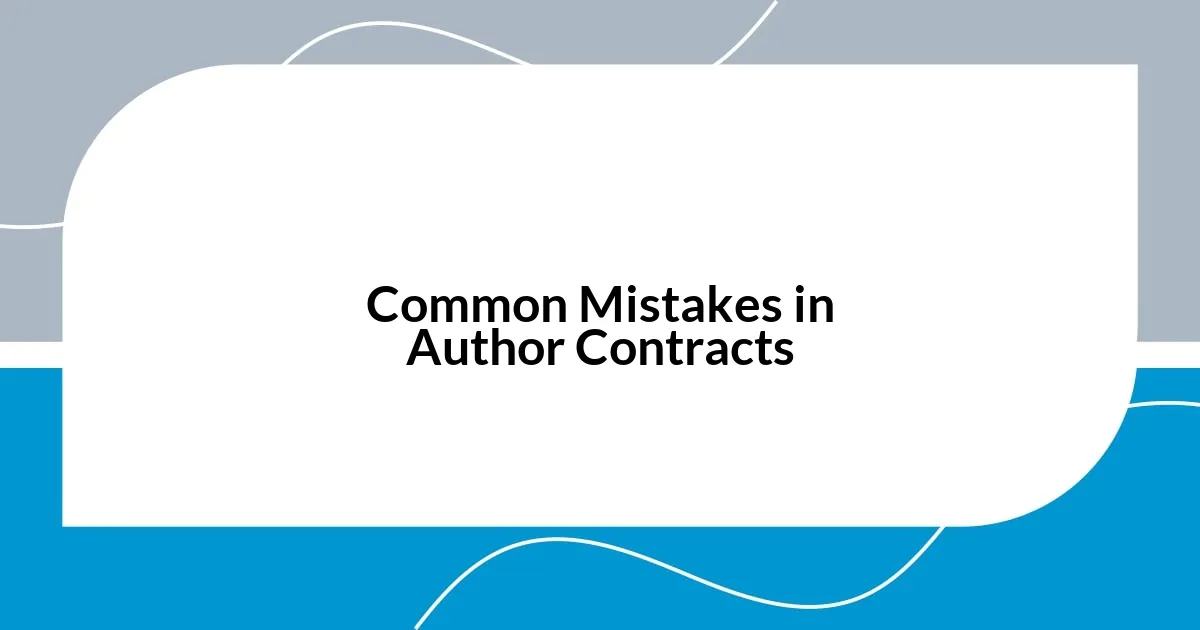
Common Mistakes in Author Contracts
One common mistake I see authors make is overlooking the fine print regarding subsidiary rights. I once signed a contract that gave away my audio and translation rights without thinking much of it. Only later did I realize how much I could have earned from an audiobook version! Have you ever thought about how these secondary markets can extend your reach and revenue? It’s crucial to scrutinize these details and negotiate terms that protect your interests.
Another frequent misstep involves not discussing the promotional responsibilities laid out in the contract. I remember a time when I assumed my publisher would handle everything, only to discover that I was expected to contribute significantly to marketing. This led me to stress when planning events and social media campaigns that I wasn’t ready for. So, ask yourself: do you know what your role in promotion is? Clarity here can set you up for success and alleviate future headaches.
Lastly, some authors neglect the importance of timeline clauses in their contracts. I, for one, didn’t pay attention to deadlines for revisions and publication dates early in my career. Unfortunately, this oversight resulted in delays that affected my following projects. It’s a simple but powerful question to ponder: do you want to control your creative timeline? Ensuring these dates are in writing can help you safeguard your workflow and peace of mind.
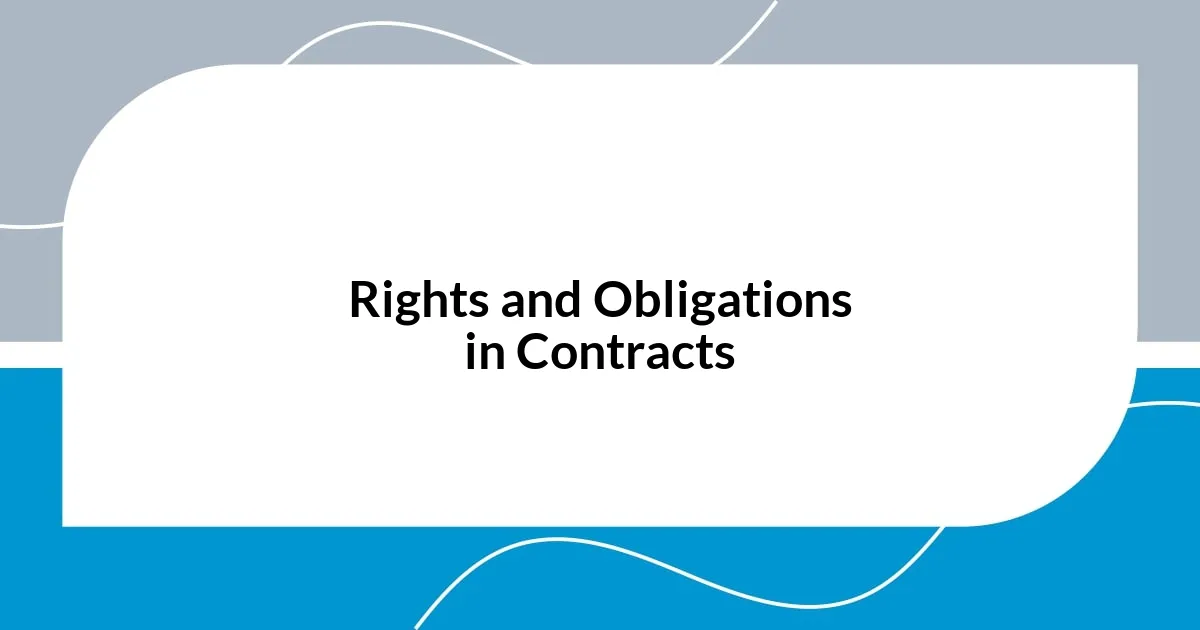
Rights and Obligations in Contracts
Rights and obligations in author contracts are at the heart of any publishing deal, shaping how your work is handled and how you are compensated. I remember feeling a surge of protectiveness over my manuscript during my first contract review. It dawned on me that I had the right to maintain certain privileges over my work, like retaining first rights for adaptations. If you think about it, these rights can significantly affect your income streams down the line, which makes it crucial to fully understand and negotiate them.
Equally important are your obligations as an author, which can sometimes be overwhelming. When I was first starting out, I agreed to a tight timeline for revisions that left me feeling stressed and under pressure. It was an eye-opener to realize that I needed to clarify my responsibilities in terms of edits and feedback. Have you considered how your commitment to deadlines can shape not just your writing process, but also your relationship with the publisher? It’s essential to strike a good balance between your duties and the expectations they place on you.
I’ve learned that when author contracts specify obligations regarding marketing and promotion, authors should take those very seriously. I once overlooked a clause that stated I needed to contribute to social media campaigns, which made me feel unprepared and anxious. Reflecting on that experience reminds me: Are you adequately prepared for your role in promoting your book? Knowing what the publisher expects from you can make all the difference and allow for a successful partnership in bringing your story to readers.
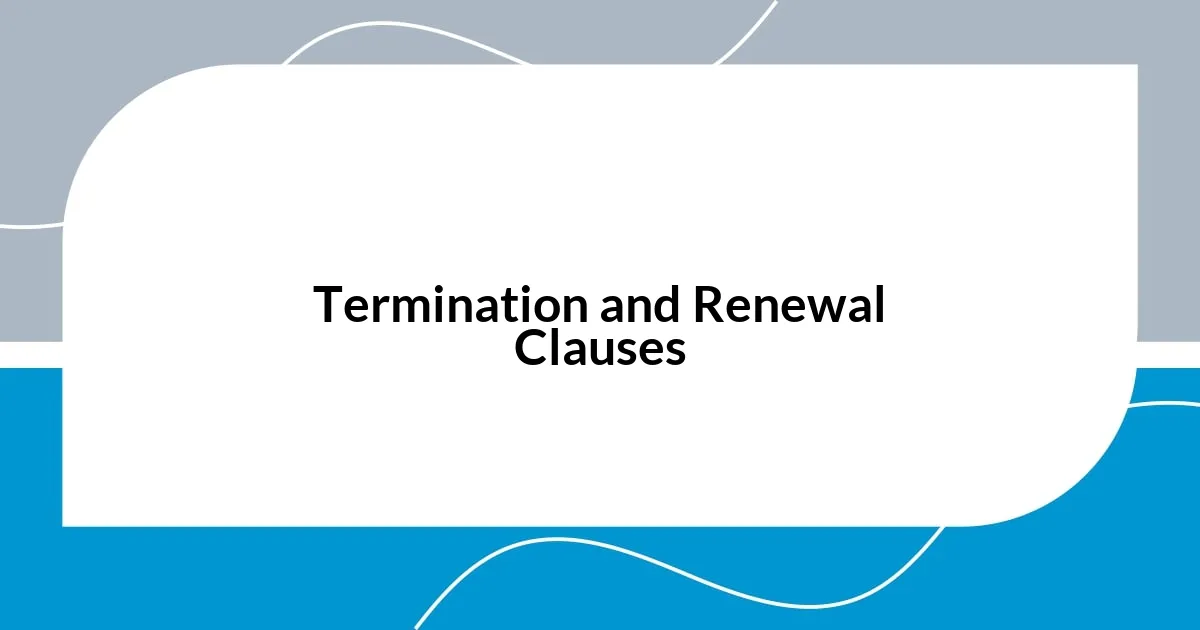
Termination and Renewal Clauses
Termination and renewal clauses are crucial components in author contracts, yet they often get skimmed over during negotiations. I once encountered a contract where the termination clause favored the publisher significantly more than me, allowing them to end our agreement at any moment. It made me realize just how important it is to have a balanced termination clause that protects both parties’ interests. Have you ever thought about what kind of safety nets you need in your contract?
When I signed my first publishing deal, I didn’t fully grasp the implications of the renewal clause. It felt almost like a formality at the time, but I soon discovered its significance when my book gained traction. The renewal period meant I could renegotiate terms based on my book’s performance rather than automatically being locked into the same deal. Isn’t it empowering to know you have the option to revisit terms as your career evolves?
I wish someone had pointed out the emotional weight attached to termination clauses sooner. It’s not just about legal jargon; it’s about the peace of mind that comes with knowing you can part ways if the partnership turns sour. I remember the relief I felt when I finally negotiated a fair clause, understanding that I could walk away if my publisher failed to meet their obligations. Reflecting on this, I have to ask: are you taking the time to ensure your contract offers you a sense of security?
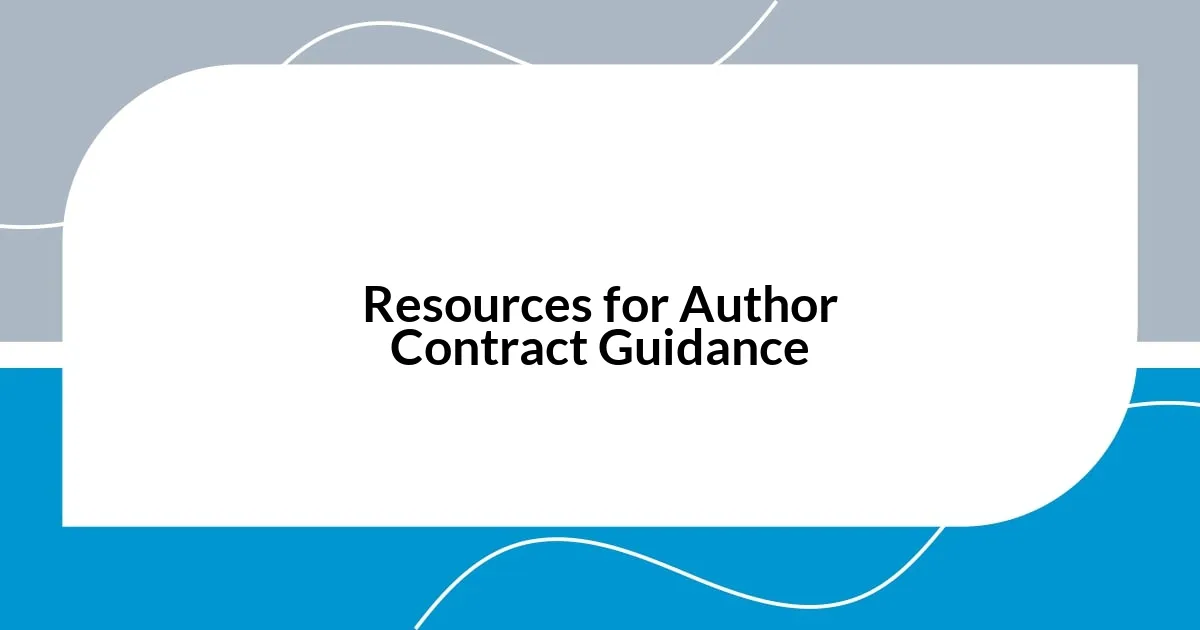
Resources for Author Contract Guidance
Navigating author contracts can be daunting, but there are plenty of resources available to help. I found websites like the Authors Guild and the Association of Authors’ Representatives to be invaluable. They offer guidelines and templates that demystify complex legal jargon, making it easier for authors to understand what they’re agreeing to. Have you checked out these resources in your journey?
Another helpful tool I’ve discovered is the online community of writers. Platforms like Twitter and Facebook groups can foster conversations where authors share their contract experiences and insights. I remember a fellow author providing advice on negotiating royalty rates, which opened my eyes to options I hadn’t considered. Connecting with others in this space has proven to be a treasure trove of practical knowledge. Isn’t it comforting to know that you’re not alone in this process?
Lastly, consulting with a literary attorney may feel like a big investment, but I believe it’s a wise one. When I approached a lawyer with my first contract, they not only clarified my rights but also emphasized the importance of long-term goals. The peace of mind I gained from knowing that I had professional support felt empowering. Have you thought about how a legal expert could elevate your understanding of contract nuances? Investing time in the right resources could save you from potential pitfalls down the line.